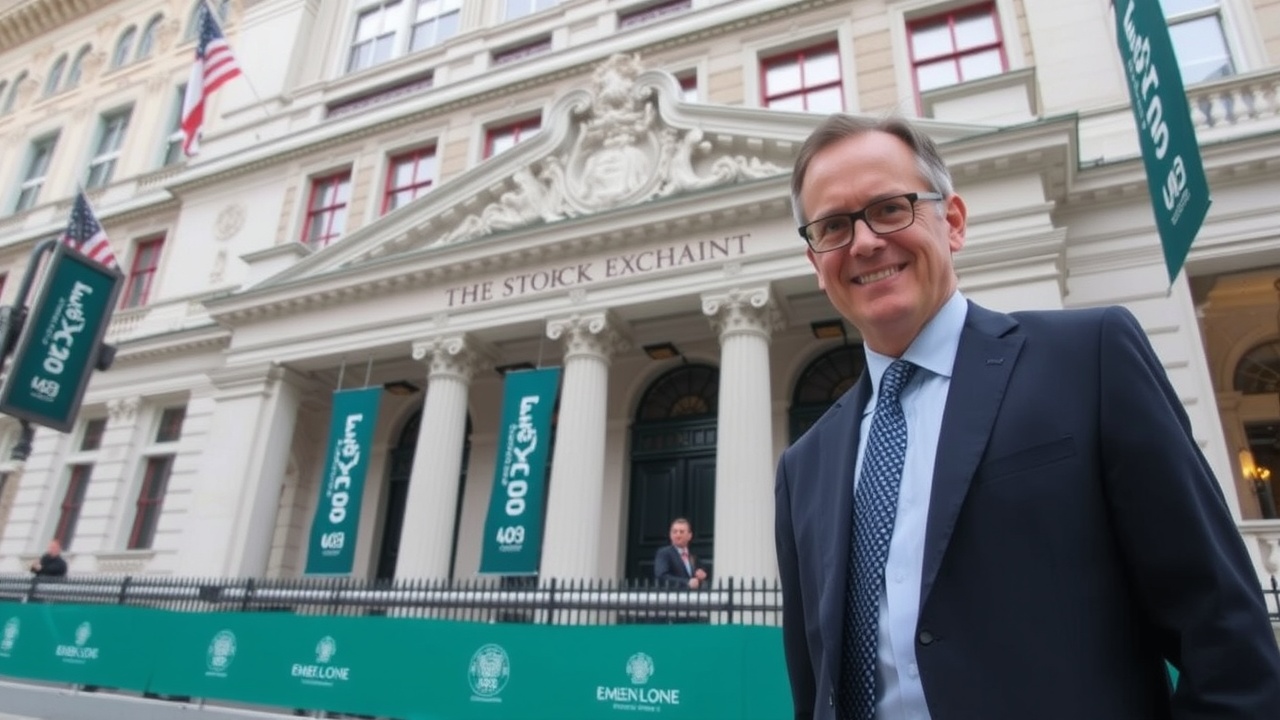
Since the global financial crisis, the LSE has seen the biggest company outflow in 2024, and Glencore may be the next
For investors, what does this mean?
It's possible that London's appeal as a place for public listings is suffering further.
This week, Glencore, a mainstay of the FTSE 100, hinted that it might decide to list somewhere "better" instead of the London Stock Exchange (LSE).
In recent years, UK stocks have been shunned by pension funds and individual investors, while listed companies have been subjected to increased taxes and regulations.
According to Glencore CEO Gary Nagle, there have been concerns expressed about whether London is the ideal location for the company's valuation.
In order to obtain the best valuation, we want to make sure that our securities are traded on the appropriate exchange, he stated.
"We must take that into consideration if there is a better one, and those include the New York Stock Exchange.
Data from the auditing behemoth EY shows that the LSE saw the biggest company outflow since the global financial crisis in 2024. Just 18 new companies were listed last year, while 88 companies left the market altogether.
Among those that dropped their primary UK listing were travel company Tui, Paddy Power's owner Flutter, and takeaway behemoth Just Eat.
Brands seem to have benefited from listing outside of London.
The share price of the semiconductor design group has risen since November 2023, when ARM Holdings chose to list on the New York Stock Exchange over London. The share price of materials specialist CRH has also increased since moving its primary listing to New York. BHP has also outperformed Rio Tinto since moving its listing to Australia in early 2022, even though the mining share market is weak.
UK companies are being encouraged to follow their lead by the success of their actions and the positive impact they have had on their share prices. In fact, the industrial equipment rental company Ashtead Group declared in December of last year that it would move its primary listing from the London Stock Exchange to the New York Stock Exchange. The business claimed to have "concluded that the US is the natural long-term listing venue" because it makes 98 percent of its total profits there.
On the other hand, UK-based businesses must contend with a growing corporation tax rate (which increased from 19 to 25 percent this year); share prices that are lowered by the stamp duty that investors must pay at the time of purchase; rising and unfriendly regulations; and a government that is, at best, unconcerned with the private sector.
For what reason is London a less desirable exchange?
Today, foreign investors, primarily Americans, dominate the shareholder lists of FTSE 100 companies, and London is no longer a significant capital market. British pension funds have lowered their domestic equity holdings from more than half to just 6% over the last 25 years. Almost never do insurance companies invest in UK stocks due to regulatory concerns. In reality, UK companies are controlled from abroad, but private investors do so through passive funds like exchange-traded funds (ETFs), unit trusts, and investment trusts.
Public opinion and the media are against listed companies' profits, particularly the sums paid to their senior management, despite the fact that their pay scales are far lower than those in the US. Both the capital and earnings taxes they pay are significantly higher than those they would pay in the United States.
Many executives are non-domicile, and they will not be pleased with the negative change in the tax laws that apply to them. Many have already moved away from the UK because they live abroad. From both a personal and business perspective, it makes sense to relocate their organization outside of London.
See also: Could the London Stock Exchange be in danger?
Ten companies that might decide to leave London.
Who will be next? The following no longer have any particular connections or allegiance to the UK, although there has been a lot of conjecture and the list is lengthy.
Rio Tinto, a mining behemoth, could be one. Since 1995, Rio Tinto's stock has been listed on both the London and Australian stock exchanges. Though the gap has recently shrunk due to rumors that Rio Tinto will follow BHP and become a fully Australian company, the London-listed shares have historically traded at a 20% discount to their Australian counterparts. In the UK, Rio Tinto obviously does not own any mines.
Additionally, Rio Tinto's activist investor Palliser Capital stoked rumors of a move in December when it called the dual-listing "outdated" and demanded that the miner abandon its primary London listing in favor of concentrating on Australia.
Shell might also depart. Following the unification of its corporate structure in 2005, Royal Dutch Shell relocated its primary listing to the United Kingdom and its headquarters from The Hague to London. It might be tempted to retreat as the UK grows more antagonistic toward hydrocarbons and the Netherlands less so.
Shell's rival, BP, may also leave. In an area where it could not provide any value, BP's diversification into renewable energy is in retreat. BP still owns assets in the North Sea, but the UK government appears intent on shutting down current operations as well as refusing to grant any new exploration licenses. BP, the biggest producer in the Gulf of Mexico, is once again focusing on the region 13 years after the Deepwater Horizon accident. The company also intends to drill a new oilfield there. It makes sense to move its main listing to New York, its headquarters to Houston, and its name to AP (American Petroleum).
Then there is HSBC, which, after acquiring Midland Bank, shifted its primary listing to the UK in 1993. However, because its British business is small, its headquarters were moved from Canary Wharf to the City. Asia accounts for half of global income, and London is no longer the major global financial hub that it once was. Whether it returns to Shanghai or Hong Kong, the Chinese would like to convince it.
When pressured by investment management firm GQG Partners to relocate its primary listing to New York, tobacco giant BAT's CEO, Tadeu Marroco, called the proposal "a distraction" rather than a denial. The New York-listed Philip Morris, BAT's primary competitor, is valued much higher.
One hundred years ago, BAT began when it and Imperial Tobacco agreed that BAT would handle the rest of the world while Imperial would handle the British market. Even though that deal was broken decades ago, BAT's sales in the UK are still negligible, so moving to the USwhere 44 percent of sales are madeis a simple choice.
Meanwhile, AstraZeneca, a pharmaceutical company, is threatening to relocate its vaccine production to the United States due to the government's intention to stop funding a new factory. In addition, the NHS's unwillingness to cover the cost of innovative medications hardly qualifies the UK as a site for a pharmaceutical company. In contrast to London, the stock market in Stockholm is doing very well.
The London listing of Prudential is undoubtedly doomed. The insurance company's Asian business has grown to such a size that it now dwarfs its once-dominant UK focus. Prudential no longer had a sizable presence in this country after spinning off its British operations with MandG in 2019. Its CEO is headquartered in Hong Kong, and it has joint primary listings in both Hong Kong and London.
In 1930, Lever Brothers and the Dutch company Van den Bergh merged to form the food and consumer goods giant Unilever. As a result, Unilever's shares were dual-listed. Investors thwarted an attempt in 2018 to unify the Dutch and British share classes in the Netherlands; therefore, a sole listing in London was used to effect the unification in 2020. In regards to tax and regulatory matters, the Dutch may have become more accommodative, and those shareholders may now regret their preference. Reverting to plan A would be a surprising move on the part of Unilever.
In 2018, RELX, another Anglo-Dutch company that specializes in data analytics, unified its share classes. However, it still maintains a secondary listing on Amsterdam's Euronext and is listed in New York as an American Depositary Receipt (ADR). Since North America currently generates 59% of its revenue and Europe, including the UK, only 21%, RELX could easily relocate to the US as well as the Netherlands.
Additionally, FTSE 100 companies like Antofagasta, Anglo American, Endeavour Mining, Fresnillo, Coca-Cola HBC, Airtel Africa, Mondi, and Hikma Pharmaceuticals that have decided to list their shares in London but have little to no operations in the UK could simply move on.
The reasons for this are inertia, the expense and inconvenience of relocating, the belief that things will improve, and the fact that they are waiting to see what other businesses will do. Many people have considered the advantages and disadvantages of moving and may have prepared backup plans, but they have decided not to move just yet. That could be abruptly altered. There was not an immediate rush for the lifeboats when the Titanic struck an iceberg, but as it became evident that it was sinking, the wait-and-see mentality gave way to a stampede.














Leave a comment on: Exodus from the London Stock Exchange: which companies might be next to leave?